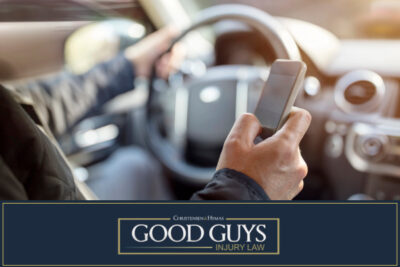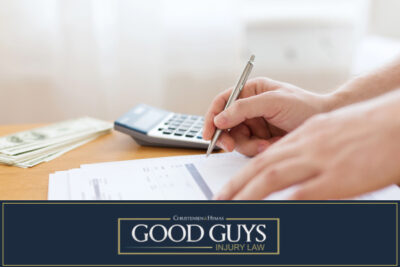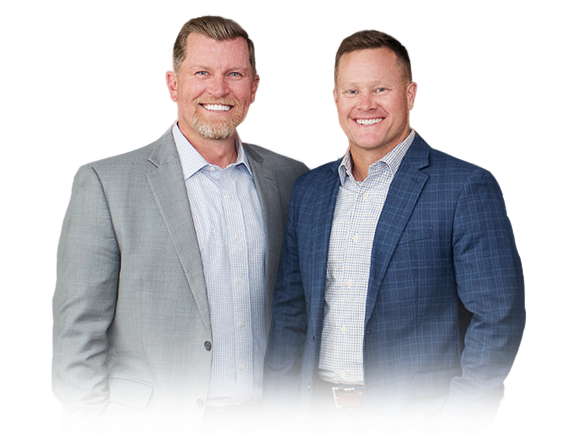 A car accident can damage more than just your vehicle or your body. Many people lose valuable items that were inside the car when the crash happened, such as phones, laptops, or other personal items. Paying out of pocket to replace these items can add stress to an already difficult situation.
A car accident can damage more than just your vehicle or your body. Many people lose valuable items that were inside the car when the crash happened, such as phones, laptops, or other personal items. Paying out of pocket to replace these items can add stress to an already difficult situation.
Good Guys Injury Law helps people across Utah understand their rights when it comes to both vehicle damage and damaged personal property. If your personal items were damaged in a car accident, we can help you seek compensation through the appropriate type of insurance claim.
Our team will walk you through the claims process, gather the necessary documentation, and deal with the insurance company on your behalf. If your losses are being ignored, we’ll fight for a fair settlement so you’re not left covering the costs on your own.
Table of Contents
Can You Get Compensation for Damaged Personal Items?
Yes, you can recover the value of personal belongings inside your car that were damaged during a crash. The amount and process will depend on the type of coverage you have and who caused the accident.
What Counts as Personal Property in a Car Accident?
In a crash, personal property refers to items that were in your car and got damaged or destroyed. These items must be your personal property and not permanently attached to the vehicle. Things like your phone, tablet, work laptop, or even prescription glasses may be included.
If you were carrying tools for work or baby gear like a car seat, these might also qualify. To file a personal property claim, you’ll need to show ownership, value, and proof that the damage happened during the car accident.
Common Types of Damaged Belongings (phones, laptops, car seats, luggage, etc.)
Some of the most commonly damaged personal property in a car accident includes electronics like smartphones, cameras, and tablets. Other examples include musical instruments, car seats, sports gear, luggage, or items you have just purchased.
If the crash caused a spill or shattered glass that ruined your belongings, that damage counts too. Anything that was reasonably being transported in your vehicle and was harmed in the crash may be covered under the right insurance policy.
When Insurance Covers Damaged Property
Whether or not your belongings are covered depends on the type of insurance coverage you or the other driver has. If the other driver’s insurance company accepts fault, they may pay for your personal property damaged in the crash.
Your own car insurance may also cover the loss if you have comprehensive coverage or added property damage protection. In some cases, renters’ insurance or homeowners’ insurance might help, too, but only if the items were not permanently kept in the vehicle.
Steps to Take After the Crash

- Take photos: Right after the accident, take clear pictures of all personal belongings inside the car that were damaged. This helps prove the damage happened during the crash.
- Gather receipts or proof of ownership: Find original purchase receipts or digital records. These documents support your personal property claim.
- File a police report: Make sure the accident report notes both vehicle damage and any other personal belongings that were affected.
- Notify your insurance company: Contact your insurance provider right away and tell them that damaged personal property was involved. Provide them with the necessary documentation.
- Keep the damaged items: Don’t throw anything away until your insurance adjuster has reviewed it. They may need to inspect it in person to approve your insurance claim.
Who Pays for Damaged Personal Belongings?
Responsibility for covering your damaged items will depend on who caused the crash and what kind of coverage exists.
The At-Fault Driver’s Insurance
If the other driver caused the crash, their driver’s insurance company should cover your losses under their property damage liability coverage. This includes your car repairs and, in some cases, damaged personal property inside the car.
However, they may push back and ask for receipts or specific documentation to prove your losses. That’s why it helps to have a personal injury attorney or car accident lawyer guide you through the process.
Your Own Insurance (Comprehensive/Collision Coverage)
If the crash was your fault or if the other driver’s insurance denies the claim, your own car insurance may help. Collision coverage might cover personal belongings in some cases, but this depends on your policy.
Comprehensive coverage often applies to non-collision events like theft or fire but may also extend to some personal property damaged in unusual car accident situations. Every insurance company and plan is different, so reviewing your policy carefully is key.
Third-Party Claims or Lawsuits
If insurance claims don’t cover your losses, you might need to file a personal injury lawsuit to recover the full value of your property. This route takes longer, but it may be necessary if the insurance company refuses to pay.
A personal injury lawyer can help determine whether legal action is appropriate for your situation and help you get the fair compensation you deserve.
How Much Can You Recover?
 The amount of money you receive will depend on how the value of your items is measured, what your policy says, and whether any exclusions apply.
The amount of money you receive will depend on how the value of your items is measured, what your policy says, and whether any exclusions apply.
Actual Cash Value vs Replacement Cost
| Value Type | Description |
|---|---|
| Actual Cash Value | Pays you the item’s value at the time of the crash, after depreciation. |
| Replacement Cost | Pays what it costs to replace the item with a new one of similar kind. |
How Depreciation Affects Your Claim
Most auto insurance policies pay based on actual cash value, which means older items are worth less. A laptop you bought three years ago won’t be valued the same as a new one. Depreciation lowers your payout, even if the item worked perfectly before the crash.
Keeping receipts, photos, and proof of use can help you argue for a better payout.
Limits and Exclusions in Auto Policies
Your auto insurance may not cover certain types of personal property damaged in a crash. Some policies have dollar limits on claims for personal items. Others exclude high-value electronics or other personal belongings unless extra coverage was purchased.
Reading the fine print helps you know what’s included and what’s not. A lawyer can review this with you and spot any hidden limits that could hurt your claim.
How a Lawyer Can Help With Property Damage Claims
Handling a property damage insurance claim alone can be stressful. An attorney can help you understand your rights, fight for a better result, and make sure you don’t leave money on the table.
Proving Value and Liability
A lawyer helps collect the evidence needed to show the value of your items and that they were damaged in a car accident. They may gather medical bills, repair estimates, or expert evaluations to support your claim.
They also help show the other driver was at fault, which is key in getting the insurance company to pay.
Negotiating with Insurance Companies
Many people accept low offers because they don’t know how to argue with an insurance adjuster. A lawyer can deal with the insurance provider, submit strong evidence, and push for fair compensation that covers all your losses, not just your vehicle damage, but also your personal property claim.
When to File a Lawsuit for Property Loss
If the insurance company won’t budge, a lawyer may recommend filing a lawsuit. This step is more common in serious car accident claims or when high-value items are involved. Filing legal action may also pressure the insurer to offer a better settlement before the case even reaches trial.
FAQs
1. Can I Include Damaged Items in Personal Injury Claims?
Yes. If you suffered injuries and also lost personal belongings in the crash, both can be included in your personal injury claims, as long as you collect evidence and file in a timely manner.
2. How Much Can I Recover From a Car Accident Settlement?
The value of your car accident settlement depends on several factors,including the cost to replace your property, lost wages, the extent of damage, and how close you are to your policy limits.
3. Should I Hire a Car Accident Attorney for Property Damage Only?
Yes, in many cases. A car accident attorney can help you get the full replacement value for your items and ensure you don’t miss out on money you’re owed, especially in claims involving auto accidents with complex coverage issues.
4. What if I Was Driving a Rental Car During the Crash?
If the crash happened while driving a rental car, you may still be able to recover compensation through your own auto insurance or the rental car company’s policy, depending on who was at fault.
5. How Is the Value of My Damaged Items Determined?
Insurers often use the fair market value or replacement value to decide how much to pay. What you recover from a car accident depends on your policy’s terms and the documentation you provide.
Call Our Utah Car Accident Lawyer for a Free Case Consultation
 If your items were damaged in a car crash, don’t assume the insurance company will automatically pay what you deserve. Getting paid for damaged personal property takes clear proof and a strong case. That’s where we come in. At Good Guys Injury Law, we’ve helped countless Utah drivers file successful personal injury claims and secure real results.
If your items were damaged in a car crash, don’t assume the insurance company will automatically pay what you deserve. Getting paid for damaged personal property takes clear proof and a strong case. That’s where we come in. At Good Guys Injury Law, we’ve helped countless Utah drivers file successful personal injury claims and secure real results.
Whether your phone, laptop, or other valuables were ruined, our team will help gather the right evidence, file your insurance claim, and hold the other driver’s insurance company accountable. We understand what it takes to win, and we’re ready to work for you.
Contact us for a free consultation today. We’ll explain your rights, review your losses, and help you get the fair compensation you need to move forward.






